Best Dog Food for Poodles
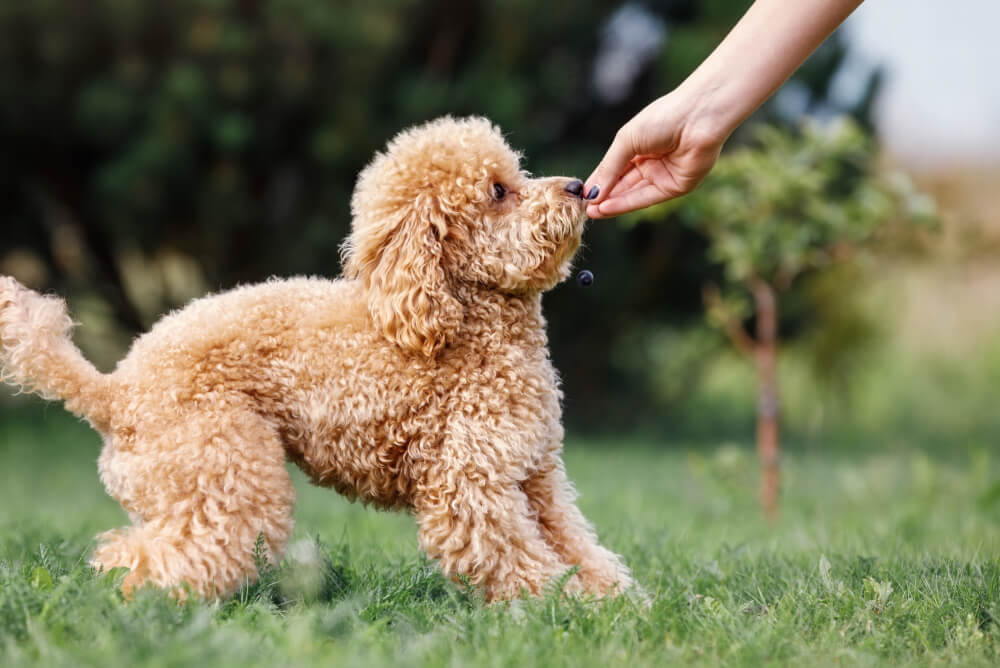
DogFoodAdvisor is reader supported See how
All reviews are 100% impartial but if you buy using links on this page, we may earn a referral fee.
What’s the best dog food for a Poodle?
The best food for a Poodle, like any dog, depends on their age, size, activity level, and any specific dietary requirements or sensitivities they may have. However, here are some general guidelines for choosing the right food for your Poodle.
Look for commercial dog foods that list a high-quality source of animal protein (such as chicken, beef, or fish) as the first ingredient. Avoid foods that contain fillers such as corn, soy, and wheat, as these provide less nutritional value.
Choose a dog food formulated for your Poodle’s life stage: Puppy, adult, or senior. Puppies need more calories and nutrients for growth, while senior dogs may require a diet tailored to their aging needs.
Poodles come in various sizes, from toy to standard. Some brands offer size-specific formulas to cater to the unique needs of each size group. Ensure you select a formula that matches your Poodle’s size.
This breed also benefits from a diet with a moderate to high protein content. Protein is essential for muscle maintenance and overall health. Aim for at least 18-22% protein content for adult Poodles and 22-32% for puppies.
Poodles are an active breed, and require a moderate amount of healthy fats for energy. Look for foods with about 8-15% fat content.
Check the ingredient list and choose foods with minimal additives, artificial preservatives, and artificial colors. Look for natural antioxidants such as vitamin E and C.
Poodles are prone to obesity, so it’s important to feed them the appropriate portion size based on their age, size, and activity level. Follow the feeding guidelines on the dog food packaging and adjust as needed to maintain a healthy weight.
On the list below…
You’ll find The Dog Food Advisor’s best dog and puppy foods for Poodles based on the life stage of your pet.
You’ll also learn the answer to the most frequently asked questions we get about this breed.
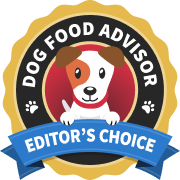
Best Dog Food for Poodles April 2024
Here are The Dog Food Advisor's best dog food brands for Poodles for April 2024.
-
1. Ollie Chicken Fresh Dog Food
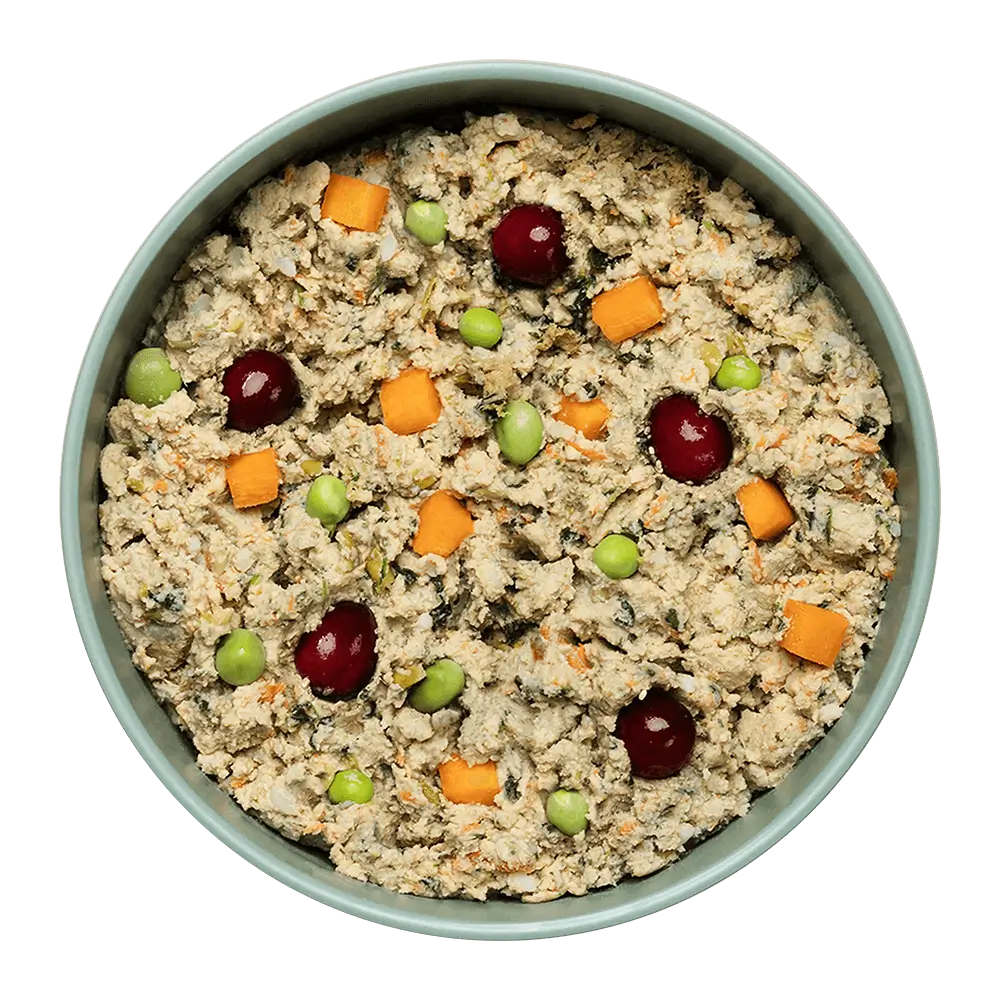
Ollie Chicken with Carrots is one of 4 fresh recipes rated in our review of the Ollie product line.
This Ollie recipe derives the majority of its animal protein from fresh chicken. Dry matter label analysis reveals the recipe contains 31% protein, 12% fat and 50% estimated carbs… creating a fat-to-protein ratio of about 38%.
Read our review of the full Ollie Dog Food Chicken Recipe (Fresh) range here
Main Ingredients Chicken, rice, carrots, chicken livers, peas Type Grain-free Protein Percentage 31% AAFCO Standards All Life Stages Best For All poodles Sample buyer review...
Read more buyer reviews at Ollie.com"Before Momo ate Ollie, she often times would get sick (diarrhea and vomiting) to the point of having to be rushed to the local emergency vet. We tried prescription dog food the vet recommended, but Momo would not touch it. I tried Ollie on a whim after hearing good reviews from a few friends and it was like Momo’s health issues went away overnight."
-
2. We Feed Raw Turkey

Turkey Patty is one of 6 fresh recipes rated in our review of the We Feed Raw product line.
This We Feed Raw recipe derives the bulk of its animal protein from turkey. Dry matter label analysis reveals the recipe contains 49% protein, 25% fat and 18% estimated carbs… creating a fat-to-protein ratio of about 52%.
Read our review of the full We Feed Raw Dog Food (Raw Frozen) range here
Main Ingredients Turkey tails, turkey gizzards, turkey wings, turkey liver, WFR vitamin + mineral mix Type Grain-free Protein Percentage 52% AAFCO Standards All Life Stages Best For All poodles Sample buyer review...
Read more buyer reviews at WeFeedRaw.com"I have been feeding my dogs We Feed Raw for 3 years now and they love their food, their coats are always shining. They are active, happy, healthy dogs."
-
3. Redbarn Air Dried Chicken

Air Dried Chicken is one of 3 dry recipes analyzed in our review of the Redbarn product line.
This Redbarn recipe obtains the better part of its animal protein from fresh chicken. Dry matter label analysis reveals the recipe contains 51% protein, 26% fat and 15% estimated carbs… which creates a fat-to-protein ratio of about 51%.
Read our review of the full Redbarn Air Dried Dog Food (Dry) range here
Main Ingredients Chicken, flaxseed, salt, salmon oil, dicalcium phosphate Type Grain-free Protein Percentage 51% AAFCO Standards All Life Stages Best For All poodles Sample buyer review...
Read more buyer reviews at RedBarn.com"Excellent – nice to have a baked kibble option during the summer heat so my pet can graze."
-
4. Nom Nom Beef Mash
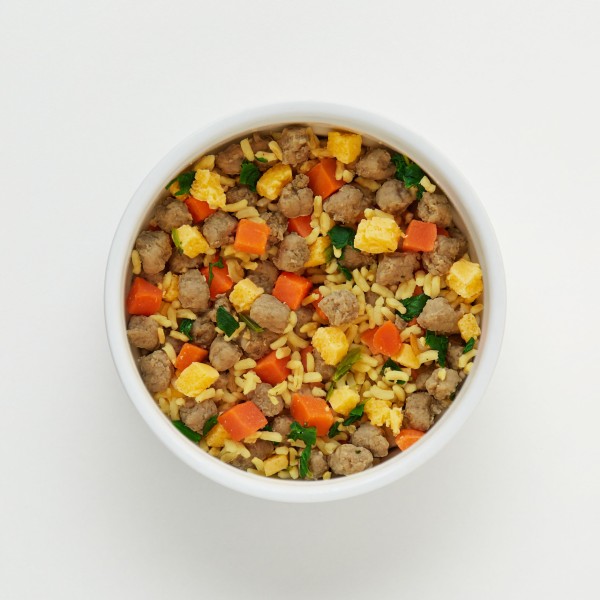
Beef Mash is one of 4 fresh recipes included in our review of the Nom Nom product line.
This Nom Nom recipe acquires the lions share of its meat protein from ground beef. Dry matter label analysis reveals the recipe contains 35% protein, 17% fat and 40% estimated carbs… delivering a fat-to-protein ratio of about 50%.
Read our review of the full Nom Nom Dog Food (Fresh) range here
Main Ingredients Ground beef, russet potatoes, eggs, carrots, peas Type Grain-free Protein Percentage 35% AAFCO Standards All Life Stages Best For All poodles Sample buyer review...
Read more buyer reviews at NomNom.com"Jones is a rescue and he came to us with a *very* sensitive stomach. Since starting Nom Nom, his stomach has been doing well, and I didn’t think his fur could get any softer."
-
5. Chicken Soup for the Soul Small Bites
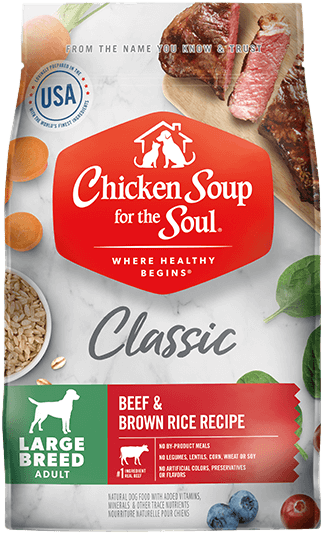
Adult Small Bites Beef Mash and Rice is one of 11 dry recipes contained in our review of the Chicken Soup for the Soul product line.
This particular Chicken Soup for the Soul dog food recipe receives much of its animal protein from beef and turkey. Dry matter label analysis reveals the recipe contains 29% protein, 16% fat and 48% estimated carbs… which produces a fat-to-protein ratio of about 54%.
Read our review of the full Chicken Soup for the Soul Dog Food (Dry) range here
Main Ingredients Beef, turkey, turkey meal, beef meal, pearled barley Type Grain-inclusive (barley) Protein Percentage 29% AAFCO Standards Maintenance Best For Adult poodles only Sample buyer review...
Read more buyer reviews at Chewy.com"I have finally found a food that my pup actually LOVES! He is a part of the family so I needed something that was healthy and also easy to eat, since he is only 10 lbs. This is the one!"
-
6. Merrick Lil Plates Grain Free Senior
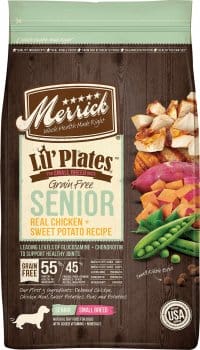
Lil Plates Small Breed Senior dog food is one of 8 dry recipes covered in our review of the Merrick product line.
Merrick Lil Plates Small Breed Senior derives a better part of its animal protein from chicken. Dry matter label analysis reveals the recipe contains 34% protein, 13% fat and 45% estimated carbs… resulting in a fat-to-protein ratio of about 40%.
Read our review of the full Merrick Lil’ Plates Dog Food (Dry) range here
Main Ingredients Deboned Chicken, chicken meal, turkey meal, sweet potatoes, potatoes Type Grain-free Protein Percentage 34% AAFCO Standards Maintenance Best For Adult poodles only Sample buyer review...
Read more buyer reviews at Chewy.com"Excellent for small dogs. Lola has been on Lil plates seniors for 2 months. Her coat is glossy and she has lost pounds. She loves it. Thank you for a great food."
-
7. Orijen Small Breed
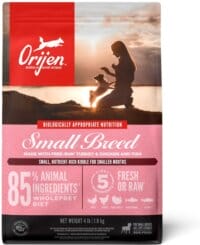
Small Breed is one of 9 dry recipes evaluated in our review of the Orijen product line.
Orijen Small Breed dog food acquires the bulk of its meat protein from turkey and chicken. Dry matter label analysis reveals the recipe contains 43% protein, 20% fat and 28% estimated carbs… which creates a fat-to-protein ratio of about 47%.
Read our review of the full Orijen Dog Food (Dry) range here
Main Ingredients Turkey, chicken, turkey giblets (liver, heart, gizzard), whole herring, salmon Type Grain-free Protein Percentage 43% AAFCO Standards All Life Stages Best For All poodles Sample buyer review...
Read more buyer reviews at Chewy.com"My small poodle loves this brand. The kibble is perfect for a 5# dog. She loves the taste and won’t eat anything else. This is really important because she is very picky."
-
8. Now Fresh Small Breed Adult
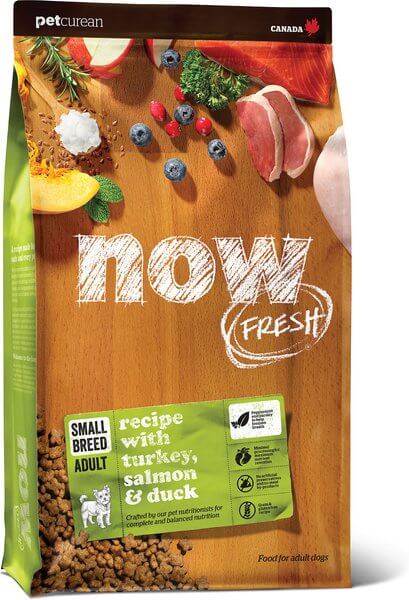
Small Breed Adult is one of 11 dry recipes included in our review of the Now Fresh product line.
This Now Fresh recipe receives the majority of its meat protein from turkey and eggs. Dry matter label analysis reveals the recipe contains 30% protein, 19% fat and 43% estimated carbs… which results in a fat-to-protein ratio of about 63%.
Read our review of the full Now Fresh Dog Food (Dry) range here
Main Ingredients De-Boned Turkey, whole dried egg, peas, potatoes, potato flour Type Grain-free Protein Percentage 30% AAFCO Standards Maintenance Best For Adult poodles only Sample buyer review...
Read more buyer reviews at Chewy.com"It is a great dog food. I recieved this as a sample for my honest opinion about this product. My dogs just loved it. Usually my 13 year old has stomach issues with different foods but not a single one. I just can’t say enough on how this product has made my day and my dogs."
-
9. Halo Chicken Stew Adult
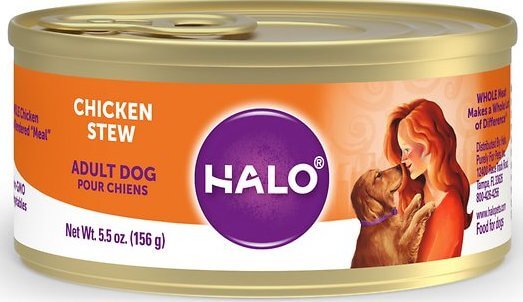
Chicken Stew Adult is one of 3 wet recipes covered in our review of the Halo product line.
This Halo recipe gets the better part of its animal protein from chicken. Dry matter label analysis reveals the recipe contains 50% protein, 31% fat and 11% estimated carbs… producing a fat-to-protein ratio of about 63%.
Read our review of the full Halo Dog Food (Canned) range here
Main Ingredients Chicken broth, chicken, chicken liver, turkey, carrots Type Grain-free Protein Percentage 50% AAFCO Standards Maintenance Best For Adult poodles only Sample buyer review...
Read more buyer reviews at Chewy.com"I recently switched to Halo chicken stew, which I mix into the Halo kibble. It smells pleasant, like real food, my dog really likes it, and it seems his digestion is better with it."
More Top Picks
To view more top dog foods by category… click the link below that best meets your personal feeding needs.
Poodles originated in Germany, where they were initially bred as water retrievers for hunting. Their distinctive grooming style served a practical purpose in the past, as it allowed for buoyancy in the water while protecting vital organs. Today, the grooming style is often done for aesthetic reasons.
Poodles have consistently been a popular breed in the United States for many years. They are known for their intelligence, versatility, and distinctive appearance, which has contributed to their enduring popularity. Poodles often rank among the top 10 most popular dog breeds in the USA based on registration statistics from organizations like the American Kennel Club (AKC).
Here are the most frequently asked questions we get about Poodles:
Frequently Asked Questions
What do Poodles look like?
Poodles are known for their unique, curly or corded coat, which is hypoallergenic and sheds very little. However, their curly coat requires regular grooming to prevent matting. They come in three size varieties:
- Standard Poodle: Over 15 inches tall at the shoulder
- Miniature Poodle: 10 to 15 inches tall at the shoulder
- Toy Poodle: Under 10 inches tall at the shoulder
How much exercise does a Poodle need?
The amount of exercise a Poodle needs can vary depending on their age, size, and individual energy level. Poodles are an active breed, and they generally require a moderate to high level of exercise to stay healthy and happy. Here are some guidelines for how much exercise different Poodle sizes typically need:
- Standard Poodle: Standard Poodles are the largest of the Poodle varieties and are quite active. They typically need at least 60-90 minutes of exercise per day. This can include brisk walks, jogging, playtime in a fenced yard, and mentally stimulating activities like obedience training or agility.
- Miniature Poodle: Miniature Poodles are smaller than Standard Poodles but still have plenty of energy. They usually require around 30-60 minutes of exercise each day, which can include walks, playtime, and training sessions.
- Toy Poodle: Toy Poodles are the smallest of the Poodle varieties, but they are still active dogs. They generally need about 20-30 minutes of exercise each day. Short walks and indoor play can help meet their exercise needs.
It’s important to remember that Poodles are not just physically active but also highly intelligent dogs. Mental stimulation is just as crucial as physical exercise to keep them engaged and prevent boredom, which can lead to behavioral issues.
In addition to daily exercise, consider engaging your Poodle in interactive play, puzzle toys, and training sessions to challenge their minds. Poodles often excel in dog sports like obedience, agility, and canine games, which can provide both physical exercise and mental stimulation.
What health conditions can affect Poodles?
Poodles are generally a healthy breed, but like all dogs, can be prone to certain health conditions. Responsible breeding practices and regular veterinary care can help minimize the risk. Here are some health conditions that can affect Poodles:
Hip Dysplasia: Hip dysplasia is a hereditary condition where the hip joint doesn’t develop properly, leading to arthritis and pain. Regular check-ups and responsible breeding practices can help reduce the incidence of hip dysplasia.
Progressive Retinal Atrophy (PRA): PRA is an inherited eye disorder that causes gradual vision loss and can lead to blindness. Regular eye examinations by a veterinary ophthalmologist can help detect this condition early.
Bloat (Gastric Dilatation-Volvulus or GDV): Poodles, especially the larger Standard Poodles, can be prone to bloat, a life-threatening condition where the stomach fills with gas and twists on itself. This requires immediate veterinary attention.
Epilepsy: Epilepsy can occur in Poodles and is characterized by seizures. Medication can often manage this condition, but it requires veterinary care and monitoring.
Skin Issues: Poodles’ dense, curly coats can make them prone to skin conditions like allergies, hot spots, and dermatitis. Proper grooming and regular skin checks can help prevent and manage these issues.
Ear Infections: Poodles’ floppy ears can trap moisture and lead to ear infections. Regular cleaning and inspection of the ears can help prevent infections.
Heart Disease: Some Poodles can develop heart issues, including mitral valve disease. Regular veterinary check-ups can detect heart problems early.
Hypothyroidism: This condition can affect the thyroid gland and lead to symptoms like weight gain, lethargy, and skin problems. It can often be managed with medication.
Addison’s Disease: Also known as hypoadrenocorticism, this condition affects the adrenal glands and can cause symptoms like weakness, vomiting, and diarrhea. It requires lifelong treatment with medication.
Cushing’s Disease: Cushing’s disease, or hyperadrenocorticism, is an endocrine disorder that affects the adrenal glands. It can lead to symptoms such as increased thirst, urination, and a pot-bellied appearance.
Luxating Patella: This condition involves the kneecap (patella) slipping out of place, which can cause lameness and discomfort. In severe cases, surgery may be necessary.
Regular check-ups with a veterinarian, a balanced diet, appropriate exercise, and responsible breeding practices are essential for maintaining the health and well-being of Poodles. If you plan to bring a Poodle into your home, it’s also a good idea to research the breeder’s reputation and ask about health testing for the parents to reduce the risk of genetic health issues.





